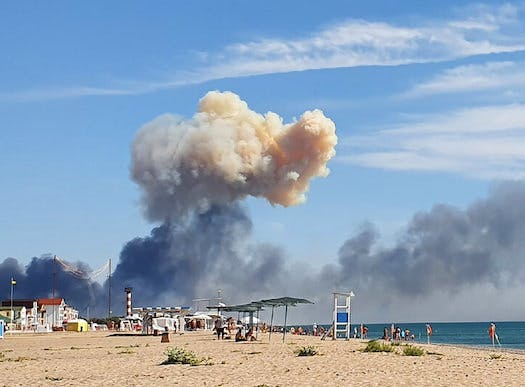The Battle for Crimea Has Begun
Pinning the attacks on saboteurs amounts to an admission that Ukrainian forces or armed groups aligned with Ukraine are now inflicting damage on Russian logistics and supply lines in Crimea.

If Russia eventually loses the battle for Crimea, the strategic peninsula that it unlawfully seized from Ukraine in 2014 and subsequently annexed, it would not be for the first time.
The Crimean War started in 1853 and ended in 1856 with Russia defeated and suing for peace; a European and Ottoman alliance had notably launched multiple attacks against Russia’s main naval base at Sevastopol. Ukraine now appears to be taking a page out of the history books and is starting to do the same, though under vastly different and arguably more volatile circumstances. It is Ukrainian territory, for one thing, and Russia covets it as much as it always has, for another. Yes, this means war.
It has been war in Ukraine, of course, since February 24, when Russia launched its full-scale invasion. Ukrainian counter-offensives are in progress in regions such as the eastern Donbas and around the port city of Kherson just north of Crimea, which Russia captured in the war’s earliest days. Today, explosions and fires ripped through an ammunition depot and destroyed electrical power infrastructure in the peninsula, in what all signs point to as the second Ukrainian attack there in just more than a week. Crimea’s regional leader, Sergei Aksyonov, said two people were injured and more than 3,000 evacuated from two villages.
Russia’s defense ministry labeled the blasts in the village of Mayskoye an “act of sabotage” that damaged “power lines, a power plant, a railway track, and residential buildings.” Pinning the attacks on saboteurs amounts to an admission that Ukrainian forces or armed groups aligned with Ukraine are now inflicting damage on Russian logistics and supply lines in Crimea. In an account of the incident, a Russian business newspaper, Kommersant, said that residents also saw plumes of smoke rise over an air base in Crimea’s Gvardeyskoye, and the AP reported that videos posted on social media showed thick columns of smoke rising over flames in Mayskoye, and a series of explosions could be heard.
Not unexpectedly, Ukraine took no public responsibility for any of the blasts, including those that took out nine Russian planes at another Crimean air base last week. A Ukrainian presidential adviser, Mykhailo Podolyak, said on Twitter, “Crimea occupied by Russians is about warehouse explosions and a high risk of death for invaders and thieves.” Crimea is popular with Russian tourists, and last week’s explosions at the Saki air base sent sunbathers on beaches fleeing as fire and smoke rose almost over their heads.
Russia blamed last week’s explosions on an accidental detonation of munitions, but satellite photos and other evidence — including the dispersed blast sites — pointed to a Ukrainian attack, perhaps with anti-ship missiles, military analysts said, according to AP. This represents a significant escalation in the war because such attacks could also indicate that Ukrainian operatives are able to penetrate deeply into Russian-occupied territory, supplementing attempts to weaken Moscow’s forces on the front lines.
The Kremlin demands Ukrainian recognition that Crimea is part of Russia as a condition for a ceasefire, but Ukraine and particularly President Zelensky have been increasingly vocal about the peninsula belonging to Ukraine. Mr. Zelensky in a recent video address said, correctly, that in effect the war started in Crimea and that it would end with the region’s liberation.
Russia is keenly aware of the strategic value of Crimea, and not only because it is the historical headquarters of its Black Sea fleet. The Kremlin has used the peninsula to launch attacks against various locations in Ukraine since the war began. The New York Times reported yesterday that “just about the entire region” of Kherson “was seized in the first weeks of the war after Russian troops struck from their bases in the Russian-occupied Crimean Peninsula” and that since then, “Ukraine’s leaders have plotted to take it back.”
Moscow in the meantime has announced that it will hold a referendum on Kherson’s integration into the Russian Federation in mid-September. Disrupting Russia’s plans would, according to analysts cited by the Times, “require Mr. Zelensky and his generals to take some kind of significant offensive action soon.”
Judging by the back-to-back and not-so-ambiguous attacks in Crimea, significant action has already started — it just doesn’t have a label. Yet it is clear Ukrainian raids on Russian-occupied Crimea mean that, fortified by more modern weapons from the West, Kyiv is going for the jugular. The next few weeks might be messy indeed, especially because it is a given that Moscow will hit back. The 21st century battle of Crimea has indeed begun.

